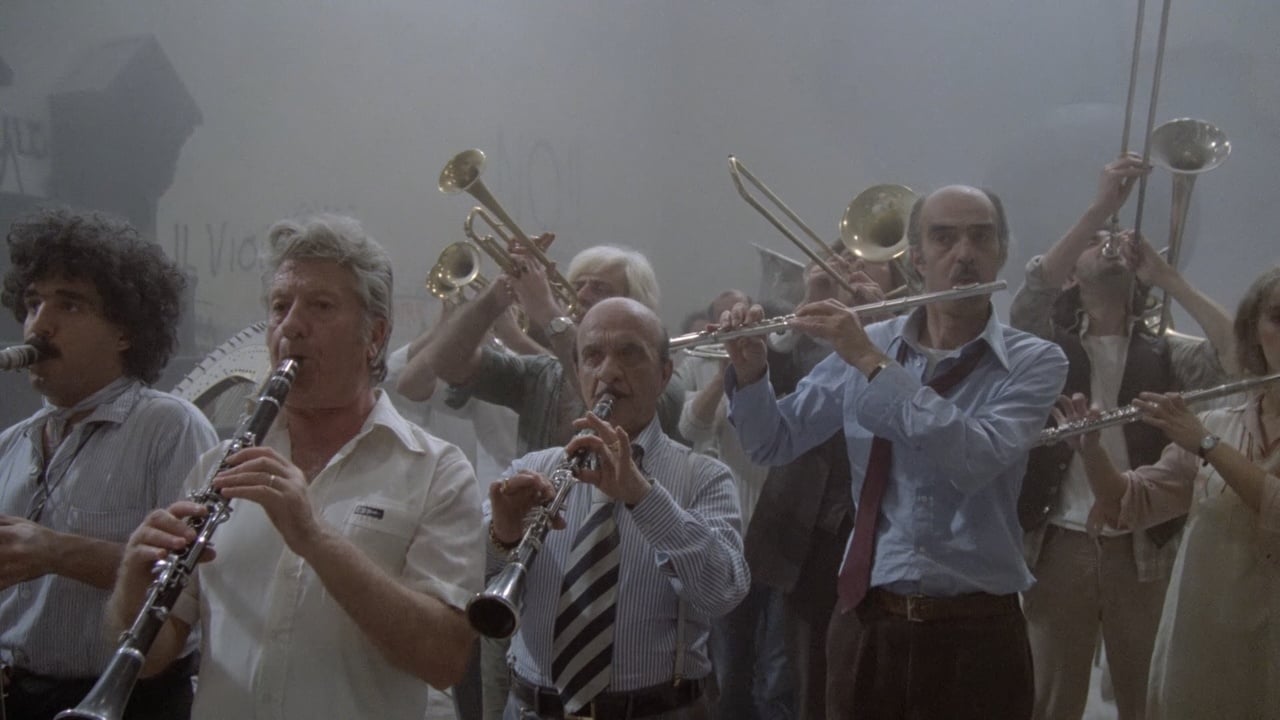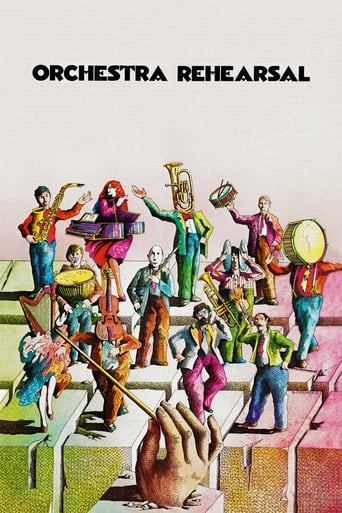

Federico Fellini is perhaps the most well-known director to come from Italy and find popularity and success around the world. So much so that the term "Felliniesque" is still used to describe films with an air of sophistication and fantasy combined to tell a story. While Fellini made a number of films for which he is noted there are still many more that have been forgotten or rarely discussed. Such is the case with FEDERICO FELLINI'S ORCHESTRA REHEARSAL.Until it was announced as coming out on disc from Arrow Academy I'd never even heard of the film other than to see it listed under Fellini's credits at IMDB. So of course my curiosity was piqued. I'd seen several films by Fellini and have always wanted to see more but have never had access to them. When this arrived I was ready to dive in.The film is a story of an orchestra coming together for a rehearsal in a rundown auditorium that used to be a church. The rehearsal is being filmed by a television crew to be shown as a documentary of how things run. To say less than smoothly is an understatement.With each successive interview done among the entire orchestra the crew learns how each member views him/herself and their instrument. Most do not see themselves as supportive members of a collective whole but deserving of attention for themselves. And as each does so their counterpoints comment about how wrong they are and that they are more deserving. In addition to that, many have a cynical attitude towards their chosen profession which would seem odd as it has provided them a living.The conductor arrives and rehearsal begins. His dictatorial manner disrupts more than helps the rehearsal though as he berates various members of the orchestra, requiring them to go over the same parts over and over again much to their consternation. The members anger and eventually their union rep, who's been there the whole time, calls for a break. When they return the arguments ensue and then something happens that changes it all.The movie is told in a more straightforward manner than the previous films of Fellini I've seen in the past. The time frame is told as the story unfolds rather than jumping from moment to moment. The same holds true for the locations used, almost all of it taking place in the auditorium. This makes it easier to follow than one would expect.The performances here come off as real, as if these were not actors but actual orchestra members discussing their craft and beliefs. None take away the center stage from another, the focus on the entire group as a whole rather than a select member or two. In so doing it helps make the film all the more realistic.After watching the film I went to look into it and discovered that Fellini was trying to depict the Italian government here with the orchestra depicting what he saw as the problem. Rather than working together to solve their problems they continued to prattle on and work against one another instead. This held true for all characters here, as individuals, as members of a union unwilling to bend and as a conductor who feels he is the final arbitrator of all things creative. With that in mind perhaps Fellini wasn't talking just about Italian politics but politics the world over.The film is well made with a subtle sense of lighting and filming that never makes you think you're seeing anything less than a film crew shooting a documentary, the camera rolling at all times with few breaks. Known for his flights of fantasy in his film Fellini chooses not to go there this time, instead telling his story in a more realistic fashion. The film has been lauded as an undiscovered classic and with the release of it to blu-ray the odds are it will soon find its audience.It might seem redundant to say this but Arrow Video has once more shown their dedication to providing the best product out there. This one is no exception with a brand new 2k restoration of the film produced exclusively for Arrow Films as part of the prestige format, Arrow Academy. Extras include "Richard Dyer on Nino Rota and Orchestra Rehearsal" with the film scholar talking about the composer and this his last collaboration with Fellini, "Orchestrating Discord" a visual essay on the film by Fellini biographer John Baxter, a gallery with rare posters and press material on the film from the Felliniana collection of Don Young, a reversible sleeve with two original artwork options and with the first pressing only an illustrated collectors booklet featuring new writings on the film by Adrian Martin.If you've never seen a Fellini film this is a good place to start keeping in mind he's toned things down here a bit. If you're a fan then you'll want to add this to your collection. It's definitely worth a watch.
... View MoreI do say this as a great admirer of Fellini's films in general. Prova D'Orchestra perhaps could have had more time to breathe for the audience, sometimes we do get the sense that we are told so much that by the next bit of information we are still trying to take in the previous. The conductor did have potential to be insightful and interesting, in most documentaries on orchestras or a certain composition or composer the conductor usually is that, but I personally did find him underdeveloped. However there are some undeniably great things about Prova D'Orchestra. It looks gorgeous, filled with shots that are distinctively Fellini(see the long-takes) and lovely scenery. Fellini's direction is as ever great, his style is definitely all over the film and it's quite nostalgic and diligent. The orchestra members' interviews are much more interesting than those of the conductor's, they do have much to say, you can tell they love it and there are bits of humour as well. I didn't quite get that sense with the conductor's monologue in the dressing room really. The basic story is not exactly new, with the whole idea of rebelling against someone, but much is done with it to make it fresh and accessible also to mainly those who take an interest in orchestral music. Which brings me to the music. The best asset of the movie for me. Maybe I'm biased as music has always held a big place in my heart and I will be doing it professionally after my degree, and I have always since The Godfather loved Nino Rota's compositions. Not only is the music beautiful but there are also some subtle humorous injections, which I found pleasing. So all in all, a very interesting Fellini film, but not one of my absolute favourites of his. 8/10 Bethany Cox
... View MoreIt is rather neglected a movie by Fellini, but I agree with those who see it as a 'metaphor' of the Italian society; not of the Italian society in general, but of the Italian society at the end of the '70s. After 1968, there was turmoil in the country and the artist's message is quite clear, apparently: prolonged social strife can lead to dictatorial outcomes. The message is not so clear at the beginning of the film and it might be seen as a sort of a 'documentary', but when that huge stone 'ball' starts pounding on the building where the 'orchestra' are rehearsing and a faraway voice starts becoming more and more clear and strong, Fellini's message becomes obvious.
... View MoreFellini's "Prova d'orchestra" was originally made for television, and there it should have stayed. As a cinematic event, it does not deliver. Yes, it's well directed and nicely acted, it has an interesting idea in it, but it's not enough for me to enjoy it. Eventually it looks like an exercise by some cinema student and not like a piece by Fellini, one of a few cinema genius of our time. I was disappointed, even though I enjoyed parts of it. My Grade: *** (out of *****)
... View More